“I wanted to do a superhero thing as if superhero things had never existed” Mark Millar talks Huck, good deeds and digital comics
Comics super-scribe Mark Millar has a new series out this week – Huck – which features art from the amazing Rafael Alberquerque and tells the story of a secret small town hero who tries to keep his powers to himself but does good deeds for the people in his hometown. It’s got a delightfully retro feel to it, so we ask the creator of Hit Girl and Kick Ass if creating Huck is his way of doing a good deed for his fans…
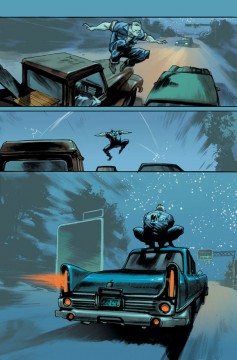
Huck has a very golden age of Superman feel, was that something you instilled from the beginning of the development?
MM: Do you know, weirdly not, I had one or two other things in mind. One of which was a Hulk/Frankenstein kind of thing, because I liked the idea of doing a big lumbering hero. I had this working title of ‘Him’ when I started thinking about it a couple of years ago, and you know the way that projects and morph and change with time. Then I thought of it being like a Captain America kind of thing, but set in one town, about this really nice guy who goes out there doing something for people. I’d been thinking of those kinds of characters, but its so obvious when I look at it now, that it does have quite a Superman vibe. I’m a gigantic Superman fan, and one of my friends said to me its like Superman if he’d never left Smallville and I was like “oh yeah, of course”, but strangely that is quite accidental.
So did you pitch the idea to Rafael fully-formed or did you work together to develop the character?
MM: Unusually, I gave it to him complete. I’d talked to another couple of artists prior, and it didn’t really quite come together, and Rafael is a guy who I’m a fan of, and wanted to work with on something. I’d thought about something else for him, then at the end, I started thinking about his kind of style, and I thought he could be really good for this. Although you don’t associate him with something quite so wholesome, theres an Of Mice and Men kind of Steinbecky quality to it, a 1930s, ‘guy-in-a-boiler-suit’ kind of feel to his stuff, and I could see that when I was looking at it. I showed him the stuff and he really responded to it and he sent through some character sketches when he read the first script and he was just perfect right off the bat and it was amazing. I guess its kind of like how Richard Donner felt when Christopher Reeve walked in wearing the Superman suit – its just like, “Yes, perfect!“.
Speaking of Steinbeck and old Americana, where did the name Huck come from? It has a very Huckleberry Finn kind of sound to it?
MM: Yeah a little bit. There were a few other names I had in my head – I’ve got like a 1000 pages of notes – and the different names were like Buds, Buck, Huck, Him. I had all these names that were lying around you know and sometimes it just hits you, the name just appears like Kick Ass. You know Kick Ass just appeared and you don’t quite know where it comes from. But I wanted something that embodied old America, something that predates superheroes because I wanted to do a superhero thing as if superhero things had never existed, so I wanted to reach back into a different kind of Americana.
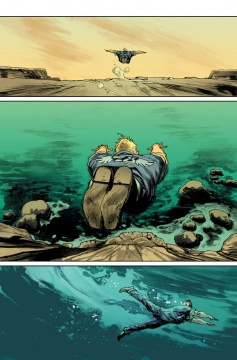
It is the ultimate American name isn’t it?! You couldn’t have a British character called Huck could you?!
MM: Oh yeah, theres no Huck McIntytre, up here!
So do you prefer writing American books like Huck to more British books like say Kingsman?
MM: Without a question. I’m much more interested in doing things set in America than in the UK. One of the things I love about setting a book in America is that everyone can understand it. People always say to me, “why don’t you do something set in Scotland?” And i was like, “you know that clock tower in the high street, that isn’t iconic to anyone except the people who live in our town”. It doesn’t mean anything, whereas the Chrysler building, there’s 6 billion people know what I’m talking about when I write a scene with the Chrysler building in. I love the shorthand of America, its a kind of convenience and laziness for a writer. But i do like the idea that if you set something in Harlem then people know what Harlem means. If you set something in Midtown people have a good idea what that means.
Do you change how you write depending on whether the audience is primarily going to be from the UK or US?
MM: Even Kingsmen I thought about the international audience, I genuinely never ever think about a British audience, i don’t even think of myself as British. I grew up loving American stuff and I just write for that audience. When I was a kid I had an American flag up on my wall and to me its an International shorthand. So if I’m writing a story I don’t even think of where its going to be set I generally set it in America, unless its a novelty like Secret Service or Supercrooks, Which was where the novelty was, instead setting a superhero/supervillain story where all the other are set, heres one set in Tenerife,
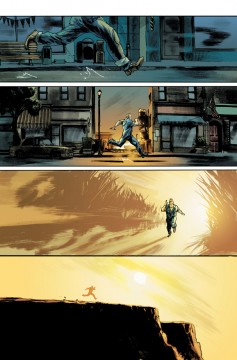
One of our highlights of the book is the way Huck uses a list good deeds as his motivation for helping people, where did that idea come from? Was it in the story from the beginning?
MM: I had this idea for a character that was the town’s biggest secret. I’d had that idea for a good few years, that kind of Frank Capra small town kind of thing where theres a bunch of people who are all know that there’s something cool in the town. Or it’s like a little Stephen King story or a Ray Bradbury kind of thing where they know they’ve got something special in the town and they keep it secret and its something lovely. I had that sort of idea jotted down as notes and then i met this guy. On Friday, sometimes, I do volunteer work and I was volunteering at this centre and I met this guy from down south. He was up here on holiday, and was coming to the centre where I was that day. He got me a chair and got me a coffee, and things like that, and he was kind of like “that’s my good deed for the day”. So i said, “what do you mean”, and he said “I always try and do something nice every day”. It was such a tiny thing but it stuck with me. Thats quite a nice way to live your life. And I remember trying it for about a week and and by day 4 I’d forgotten to continue. But I remember thinking that’s quite a nice attitude, that we’re all kind of busy in our day, and we do our daily routines, but if you make that little point of doing something nice, then by the end of the week you’ve done 7 good deeds, by the end of the year you’ve done 365. There something quite good about that, and it felt quite superhero-ey, and so i locked that away in the back of my brain then added it into this project
There is an element of origins being glossed over and just explained too simplistically don’t you think? Because we are all familiar with superhero cliche and know whats coming. But Huck has a definite code and reason behind his heroic actions.
MM: I think especially now, we have really quite complicated set-ups as origins if we are creating something. I just love the simplicity of Huck. That whether this guy could lift a car up with two hands, or he was a regular guy he would still do something nice. And most of the things he did weren’t that visually interesting. So he’s maybe just paying for somebody’s lunch who’s standing behind him in McDonalds, or putting money in a library book for somebody to find. I think all those kinds of tiny things are actually feasible, something you can relate to and that seems interesting.
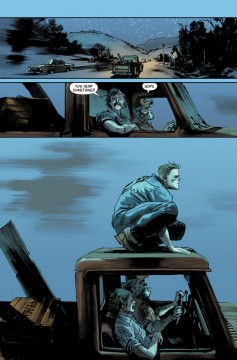
And his motives are pure, he isn’t running off to save the world Avengers style!
MM: I think the idea of staying out of politics is good and just doing something because its the right thing to do. If somebody’s been kidnapped he’ll go and find them. If somebody lost something like their pet mouse he’ll go and find it. There’s such a simplicity to that, it makes it incredibly easy to write actually, and it goes off in very interesting directions from here. Obviously issue 1 is just where it kicks off, but it really goes off and does its own thing from this point.
How long a series is it going to be? An ongoing series or a limited run?
MM: It’s going to be at least 18 issues, starting off with this 6 issue run, and I’ll do probably 6 issues every year. I’ve got 18 of them worked out and it could go longer, I mean, I’ve got this vague idea of it maybe being 24, but its going to be at least 18,
How will we see the story develop in the upcoming issues?
MM: It’s funny, because it does move out of the town pretty quickly, and thats obviously the starting point. It’s funny when I see people trying to anticipate what’s coming next, thinking its about the town. Or my favourite thing, is when are people are saying “and then Huck’s going to kill everyone of course”. When I was reading it I was thinking this is hilarious, its amazing that no-one is guessing where this is going and I can guarantee he’s not going to kill anyone.
The opening 6 pages are dialogue free, was that your idea of Rafael’s?
MM: No, thats the way the script was when I sent it out. Once I’ve written the script its kind of in stone, you know, I think it’s always a mistake to go changing things. I do lots of changing at the writing level, once the script is done and sent off to someone, thats that, I’ve rewritten in my head 20 times by that point. But if an artist has a little way of doing something, like maybe combining two panels or turning something into a splash that wasn’t, or adding an extra page then I’m always open to it. of course I am. I mean the guys I work with are so good, you’d be a fool not to listen to them.
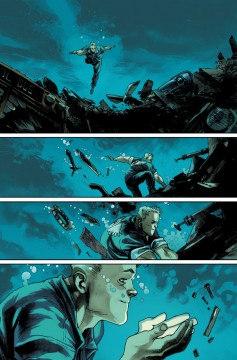
And is there any differences in writing a dialogue free page compared to a dialogue heavy page?
MM: I try and put as little dialogue as possible in because I remember reading this thing that [legendary Batman writer] Denny O’Neill said “in a good comic, the dialogue is like newspaper headlines written by poets” , and thats such great way of describing it. You try and be as minimal as you can, you don’t leave any fat on the page at all. And its the same with scenes as well, come into a scene as late as you can and come out as early as you can, don’t waste anything. So I try and construct my things so that if you remove a word, it screws it up or if you remove a panel it screws it up, and I think if your comic isn’t written that way, then you’ve done it wrong.
Huck feels very similar in tone to books like Superior and Starlight, is that a reflection of the direction you are heading in with your writing, i.e. away from the violence of Hit Girl or Nemesis?
MM: I think its just the ones I’m doing at the moment. At the moment I’m certainly drawn to stuff in the last two or three years thats a little lighter. I mean I enjoy both. I was watching Kingsmen again a couple of months back, I think when the DVD came out, and i love it and its hyper-violence, but its fun you know, its entertaining. But sometimes you want that, sometimes you want Quentin Tarantino, and sometimes you want Steven Spielberg. I think where my head is at the moment – I want Steven Spielberg. So everything I’ve been doing has got that the vibe of an Amblin movie from the ‘80s or something that just makes you feel good. I think as a reader that’s what I’m interested in and as a writer that’s what i want to write.
You write in a column for Total Film about how the Man of Steel movie inspired, or rather uninspired, you when creating Huck – a lot of people will probably agree with you on that?
MM: I think if it had come out 10 years earlier i think it would have been different. I think at the moment its not the Superman movie I was after. It was very well written and beautifully directed and everything, and Henry Cavill in the best Superman since Christopher Reeve, but tonally I wanted something that was a bit more fun. I think i remember when Guardians of The Galaxy came along, I remember thinking this is just my idea of a good night out. Sometimes you just want to be entertained!
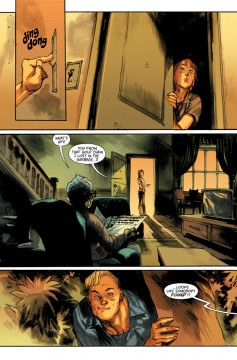
Digital comics is our main focus here at Pipedream Comics, what are your thoughts on the digital comics revolution and how has it affected Millarworld for better or worse?
MM: I think I was sceptical at first because, the way I looked at it, if something is coming out there as a rival to what you’re trying to do then it can only take sales away from you. I was actually very sceptical about digital for the first couple of years and i purposefully said that I wanted to have a delay on my books for several months so that retailers weren’t being hit. I know a lot of retailers, if their sales drop by 10%, then they’re out of business. Theres a lot of stores that are just on the breadline, just making a living, so i thought if something came along like digital, and especially if they undercut prices, I thought this was bad. Some stores could be hit like 20%, 30%, 40%, and I didn’t want to see this. If there’s a lot of stores on the breadline like that, and they all went, then there’s a mass detrimental effect on the industry because the backbone of the industry is retail.
So I looked at it for 12 financial quarters and sat back and waited to see how it went, and what was very interesting, is actually that sales went up overall when digital came in. So I was really pleased by that, as its an extra source of revenue coming in for us the creators. So I was pleased it wasn’t detrimental and that it actually helped. So I said “I’m up for this, day and date, I’ll have my books come out at the same time”. So I’m delighted that it’s worked out, I just think it was a risk. But it’s a risk that seems to have worked out, because a lot of people don’t live near a comic store and it’s been brilliant for keeping them in their hobby. I’m a convert now, i really like it.
So are you reading everything on iPad or tablet now? And what are your reading?
MM: Generally I still pick up paper. What i find it handy for is I use it a lot for reference and it will be something stupid like, I think of a layout that I liked from a beautifully drawn issue of something that’s just in my head. But I can’t quite remember the way this layout was when I’m sat here doodling my own comics. So I remember that, and I don’t have it handy, so i buy it on digital and have it up on screen. It means I don’t have to rifle through boxes that I haven’t got in any kind of particular order, or i don’t have to go to a comics store and get a back issue. Its amazing that I’ve got this amazing resource that costs me like a $1.50 and I get to see the panel I wanted.
You can purchase Huck #1 for £1.99/$2.99 from ComiXology or as a DRM-free version from the Image Comics Store.



July 14, 2025 @ 12:19 am
Hello men
Hello. A 18 cool website 1 that I found on the Internet.
Check out this website. There’s a great article there. https://techrobonic.com/exploring-the-worlds-most-isolated-islands/|
There is sure to be a lot of useful and interesting information for you here.
You’ll find everything you need and more. Feel free to follow the link below.
September 20, 2025 @ 4:13 pm
Hello comrades
Good evening. A 22 excellent site 1 that I found on the Internet.
Check out this site. There’s a great article there. https://winoramacasino.es/apuestas/20bet-y-el-auge-de-las-apuestas-en-el-futbol-femenino/|
There is sure to be a lot of useful and interesting information for you here.
You’ll find everything you need and more. Feel free to follow the link below.
September 26, 2025 @ 3:47 am
Hello colleagues
Hi. A 23 great website 1 that I found on the Internet.
Check out this website. There’s a great article there. https://swordfishusa.com/esports-bets/spread-betting-explained-how-to-make-profitable-bets/|
There is sure to be a lot of useful and interesting information for you here.
You’ll find everything you need and more. Feel free to follow the link below.
September 27, 2025 @ 5:19 pm
Hello .
Hello. A 23 nice site 1 that I found on the Internet.
Check out this website. There’s a great article there. https://regionalassociates.eu/new-and-old-slots/online-casinos-why-it-is-important-to-choose-the-licensed-ones-and-how-to-choose-them/|
There is sure to be a lot of useful and interesting information for you here.
You’ll find everything you need and more. Feel free to follow the link below.
September 28, 2025 @ 11:32 pm
Hello guys
Good evening. A 23 very cool website 1 that I found on the Internet.
Check out this website. There’s a great article there. https://castoroilguide.biz/martingale-betting-system/sporting-events-for-pro-bettors/|
There is sure to be a lot of useful and interesting information for you here.
You’ll find everything you need and more. Feel free to follow the link below.
September 29, 2025 @ 6:45 am
Hello guys
Hi. A 23 nice site 1 that I found on the Internet.
Check out this site. There’s a great article there. https://dog-carrier.biz/online-casinos/selecting-a-payment-method-for-gambling-in-casinos/|
There is sure to be a lot of useful and interesting information for you here.
You’ll find everything you need and more. Feel free to follow the link below.
November 16, 2025 @ 11:41 am
Hello !
Hello. A 26 cool website 1 that I found on the Internet.
Check out this website. There’s a great article there. https://speedwaymedia.com/2022/03/16/staying-safe-online-gambling/|
There is sure to be a lot of useful and interesting information for you here.
You’ll find everything you need and more. Feel free to follow the link below.
December 20, 2025 @ 9:06 am
Nach dem Tod von François Blanc am 27. Dezember 1870 wurde der Casinobetrieb wieder
aufgenommen. Im Oktober 1868 wurde die Eisenbahnlinie eröffnet, was zu einer drastischen Zunahme der Besucher führte, und am 8.
Blanc trieb deshalb den Bau von Hotels, der Uferstraße
und der Bahnlinie voran. Blanc erkannte sofort, dass die bisherigen Probleme nicht zuletzt auf die schlechte Verkehrsanbindung und die fehlenden Hotels zurückzuführen waren. Dazu gründete er die noch heute bestehende Société des
Bains de Mer et du Cercle des Étrangers à
Monaco (SBM).
Ob Sie spielen oder nicht, ein Blick in Monte Carlos legendäres Belle-Époque-Kasino aus Marmor und Gold ist ein Muss in Monaco.
Das Restaurant Le Salon Rose mit seinen Alkoven und seiner hohen Decke hat sich
seine Boudoir-Atmosphäre bewahrt und bietet
eine Küche von hier und anderswo. Ansonsten bietet das Casino de Monte-Carlo eine Vielzahl
von Spielen für jeden Geschmack. Da diese Anbieter möglicherweise personenbezogene Daten von Ihnen speichern, können Sie diese
hier deaktivieren. Wir nutzen auch verschiedene externe Dienste wie Google Webfonts,
Google Maps und externe Videoanbieter. Diese können Sie in den Sicherheitseinstellungen Ihres Browsers einsehen.
References:
https://online-spielhallen.de/stakes-casino-cashback-ihr-weg-zu-mehr-spielguthaben/
December 27, 2025 @ 1:37 am
Online casinos that prioritise player privacy implement advanced security measures, such
as SSL encryption, to safeguard sensitive data against breaches and unauthorised access.
These policies outline how the casino collects, uses, and protects
players’ personal information. It’s not just about the size of casino bonuses but also the fairness
of the terms and conditions. We aim to provide Australian players with honest,
unbiased insights, making sure we highlight both the pros and cons of each gambling site.
Playing at Mafia Casino is a no-brainer thanks to instant deposit and withdrawal
options for all types of players.
Both – many online casinos produce real money apps that you can download onto your mobile device.
We find the places with the biggest and best range of games, great real money casino bonuses when you sign up, and good customer support if you get
into a sticky patch with your games. Our Australian experts review, compare and test a massive range of real money gambling sites to find you a great online casino Australian dollars are
accepted at. Real-money welcome bonuses are a great option for Aussie gamblers making their first deposit at an online casino, AUD or US dollars,
and you can often earn a 100% match bonus up to hundreds of dollars.
That’s why our team goes through all of the top online casino sites, and the dizzying array of deposit methods and choice of currencies they offer Australian gamers in 2025.
Additionally, you can play poker at real money online casinos using your smartphone.
You can legally play casino games for real money at offshore gambling sites in Australia.
More than one provider supports new online casinos Australia,
which unlocks an extensive list of casino games
to play. The best Aussie online casinos offer top casino games from online casinos Australia.
Software providers create online pokies real money games
in several themes to attract players with different interests.
December 27, 2025 @ 11:46 am
The touch interface of Plinko casino deserves special praise!
Whether you’re waiting for a bus or relaxing at home, this brilliantly optimized
mobile version ensures you never miss a moment of Plinko action. With Hacksaw Gaming’s impeccable attention to detail and fair
play mechanics, you can dive into the action with
complete confidence. Every drop is a new adventure, every bounce a moment
of possibility. Don’t just read about it – experience the thrill!
The game is regularly audited by independent testing agencies
to ensure fair outcomes and that results cannot be manipulated.
No strategy can guarantee wins due to RNG mechanics.
Winnings can be withdrawn according to casino
policies. The ball bounces randomly through pegs, determining your
prize multiplier.
References:
https://blackcoin.co/where-luxury-meets-excitement-pullman-reef-hotel-casino/
December 29, 2025 @ 5:43 am
usa casino online paypal
References:
https://jobsremote.work/employer/top-paypal-online-casino-list-by-luckygambler-december-2025/
December 29, 2025 @ 6:00 am
online slot machines paypal
References:
https://suryapowereng.in/
January 11, 2026 @ 8:44 pm
Excellent article. Keep posting such kind of info on your page. Im really impressed by your blog.
January 13, 2026 @ 11:19 am
Hurrah, that’s what I was seeking for, what a material! existing here at this web site, thanks admin of this web page.
January 13, 2026 @ 3:39 pm
Hurrah, that’s what I was seeking for, what a stuff! present here at this weblog, thanks admin of this web page.
January 13, 2026 @ 7:58 pm
Hurrah, that’s what I was seeking for, what a information! present here at this weblog, thanks admin of this web page.
January 14, 2026 @ 12:17 am
Hurrah, that’s what I was looking for, what a information! present here at this website, thanks admin of this site.
January 14, 2026 @ 4:37 am
Hurrah, that’s what I was looking for, what a data! present here at this blog, thanks admin of this web site.
January 14, 2026 @ 8:59 am
Hurrah, that’s what I was looking for, what a information! existing here at this website, thanks admin of this website.
January 14, 2026 @ 1:25 pm
Hurrah, that’s what I was looking for, what a stuff! existing here at this weblog, thanks admin of this web site.
January 14, 2026 @ 6:05 pm
Hurrah, that’s what I was looking for, what a information! present here at this website, thanks admin of this site.
January 14, 2026 @ 10:46 pm
Hurrah, that’s what I was seeking for, what a data! existing here at this web site, thanks admin of this site.
January 15, 2026 @ 3:33 am
Hurrah, that’s what I was searching for, what a stuff! existing here at this website, thanks admin of this web site.
January 15, 2026 @ 10:08 am
After I initially left a comment I seem to have clicked the -Notify me when new comments are added- checkbox and from now on whenever a comment is added I receive four emails with the same comment. Perhaps there is a means you are able to remove me from that service? Thanks!
January 15, 2026 @ 2:26 pm
When I originally commented I seem to have clicked on the -Notify me when new comments are added- checkbox and now whenever a comment is added I receive four emails with the same comment. There has to be a way you are able to remove me from that service? Thanks a lot!